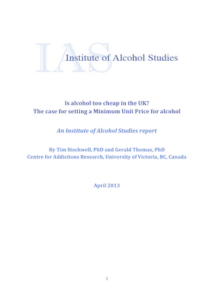View this report

This paper offers a perspective on the research evidence for minimum pricing for alcohol as a public health measure from a country where this policy idea originated. It looks at the current data on the negative impacts from heavy drinking in the UK, framing the need for an effective policy response, and gives an overview of the evidence to support minimum unit pricing (MUP) as a means of addressing the issue.
In presenting the evidence to support MUP, this paper addresses some common criticisms of the policy, including those that have originated from alcohol industry sources. It concludes that policymakers can be confident that substantial total net health and social benefits will follow if MUP is introduced in the UK.
Key points
The extent of the problem
- Official estimates of about 9000 alcohol related deaths annually are low as they exclude 4600 deaths from alcohol-related cancer and a wide range of alcohol-related injuries
- UK alcohol consumption has risen in the last three decades and is now 80% above the global average
- More than half the alcohol sold in the UK is consumed above recommended daily limits
- Alcohol is 45% more affordable than in 1980 and both men and women can exceed recommended daily limits for about £1 if they purchase inexpensive alcohol from supermarkets or other outlets
Evidence to support minimum unit pricing
- There is strong and clear scientific evidence that increased alcohol prices reduce hazardous drinking and serious alcohol-related problems
- University of Sheffield researchers estimate an MUP of 45p would prevent 344 deaths, 13,900 hospital admissions and 24,100 crimes in England each year with additional benefits after 10 years
- Canada is one of six countries that have introduced some form of minimum pricing and recent peer reviewed research indicates the Sheffield estimates of benefits are conservative
- Data from Canadian provinces suggest that a 10% increase in average minimum price would result in the region of an 8% reduction in consumption, a 9% reduction in hospital admissions and a 32% reduction in wholly alcohol caused deaths – with further benefits accruing two years later
- Evidence shows MUP targets the heaviest drinkers, whilst having minimal impact on the amount spent by moderate drinkers
Addressing criticisms of minimum unit pricing
- Criticism of the Sheffield and Canadian research, much of it from commercial vested interest groups, has been inaccurate and misleading
- Unintended negative consequences from MUP are minor in comparison with the substantial health, social and economic benefits the policy creates
- There is clear evidence that substitution with various forms of illicit or unrecorded alcohol would only slightly offset the significant health benefits of increased prices
- Individuals and families on low incomes would be among the least affected by the policy as they are more likely to be abstainers or low risk drinkers than those on higher incomes
- Low income families with heavy drinkers and others would benefit financially by having less risk of loss income through death, injury, illness and/or long-term disability of a drinking family member
- MUP would also reduce the risk of being harmed in some way by someone else’s drinking
View this report
